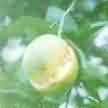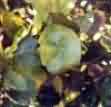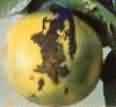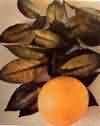खट्टे फलो की खेती में पोषक तत्वों संबंधी विकार एवं उनका प्रबंधन
The productivity as well as the quality of citrus fruits is affected to a greater extent due to the physiological and nutritional disorders. In citrus fruits, the deficiency of micronutrients causes many more disorders than that of macronutrients.
Nutritional disorders have become widespread with diminishing use of organic manures, adoption of high density planting, use of root stocks for dwarfing, disease and salt tolerance, unbalanced NPK fertilizer application. To get high quality fruit and yields, micronutrient deficiencies have to be detected before visual symptoms are expressed.
1. Boron deficiency in Citrus
Symptoms:
- Citrus trees deficient in boron produce distorted leaves.
- Mature leaves show corking or splitting of veins and midrib. Leaves are twisted.
- Fruits tend to be hard and mis-shaped. Cracking of fruits is also seen.
- Brown gum pockets are seen in the albedo and around the seeds which may be aborted.
- Corking of veins is seen as in the greening disease and in the yellow corky vein disease.


Boron deficiency symptoms on leaf and fruit
Correction
- Deficiency of this nutrient can be overcome by spraying 0.1 per cent solution of either borax or boric acid.
2. Copper deficiency
Copper deficiency is seen in situations where zinc, iron and manganese deficiency are seen and when copper based fungicides are not used.
Symptoms
- Copper deficiency results in dark green leaves borne on S-shaped twigs.
- Dieback of twigs is noted.
- Slits occur on the bark of stems and gum exudes.
- This condition is called exanthema.
- Fruits show gum pockets around central pith.
- Gum exudation can be seen on the rind also.

Deficiency symptoms on fruit
3. Iron deficiency
Symptoms:
- Iron deficiency is a problem in alkaline soils.
- Deficiency of iron results in a net work of green veins against light green or yellow background.
- In extreme cases, the entire leaf becomes chlorotic.
- Reduction in fruit size may occur.

Iron deficiency symptoms on leaves
Correction
Iron deficiency can be overcome by repeated weekly sprays of 0.25 per cent iron sulphate or 1 per cent ferrous sulphate after neutralisation with lime till the fresh growth ceases to show the deficiency symptoms.
4. Magnesium deficiency
Magnesium deficiency is chiefly the result of accumulation of imbalanced availability of calcium, potassium and in the soils grown with continuous imbalanced manuring with potassium or calcium containg fertilizers.
Symptoms:
- In very early stages, small irregular yellowish areas are seen between main veins and on both sides of midrib.
- A well defined yellowing of leaves with a dull green area in the shape of an inverted Vat the leaf base occurs.
- Corking of midrib and main veins may show up.

Magnesium deficiency symptoms on leaves
5. Manganese deficiency
This nutrient could be expected to show deficiencies when zinc and iron are also deficient.
Symptoms:
- Characteristic symptoms of manganese deficiency are the green midrib and veins with green bands and light green interveinal areas.
- Unlike zinc deficiency, leaf size is not reduced due to manganese deficiency.
- Symptoms are more prominently seen on the shady side of the tree.
- Pronounced leaf symptoms are seen on mature leaves.


Manganese deficiency symptoms on leaves
Correction
Deficiency of this nutrient can be overcome by spraying 0.20 per cent manganese sulphate twice at weekly intervals.
6. Potassium deficiency
Symptoms:
Potassium deficiency results in twisting, curling and puckering of leaves. Leaves may show non-uniform yellowing and bronzing. Twig growth is weak. Trees are stunted. Fruit size gets reduced.

Magnesium deficiency symptoms on leaves
Correction
In deficient soils, application of potassium sulphate or muriate of potash can be made in split doses. Application of maintenance dose of potassium can prevent deficiency of this nutrient. A spray of one percent potassium nitrate is also useful.
7. Zinc deficiency
Symptoms:
- Terminal shoot leaves show yellow blotches in between veins.
- The green color persists along with midrib and lateral veins.
- Leaves are small, narrow, pointed and chlorotic.
- Affected twigs are erect and bushy.
- Chlorotic leaves drop off early leading to die back of twigs.
- Multiple buds also appear. Tree remains stunted.
- Fruits are small, mis-shapen and insipid. Yield is also reduced.
- In mild cases, the pattern resembles manganese deficiency.

Zinc deficiency symptoms on leaves
Correction
Zinc deficiency can be corrected by foliar spray of 0.25 per cent zinc sulphate twice at weekly intervals and subsequently, soil application of zinc sulphate @ 100 g per basin.
Reference:
Handbook of horticulture: K. L. Chadha, Horticulture at a glance: A.S. Salariya, Physiology of fruit production: Hare Krishna
Authors:
Avinash Parashar1*, Pramod Kumar Kumawat2, Hare Krishna3
1Senior Research Fallow, CIAH, Bikaner-334006
2Ph.D. Department of Horticulture, SKRAU, Bikaner-334006
3Sci. Scientist, CIAH, Bikaner-334006
*Email-
